Yi Jing Hexagram 28 - Line 4
The hexagram: 28
An hexagram is a combination of six yin and yang lines.
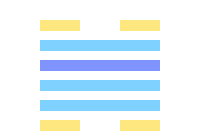
28.4 (28 > 48) - THE TÂ KWO HEXAGRAM.
The fourth line, undivided, shows a beam curving upwards. There will be good fortune. If (the subject of it) looks for other (help but that of line one), there will be cause for regret.
Bing DeepL Google Yandex28.4 (28 > 48) - Being weakened
One is supported by others but needs to recover.
Bing DeepL Google Yandex28.4 (28 > 48) - Being weakened
One is supported by others but needs to recover.
Bing DeepL Google Yandex28.4 (28 > 48) - Tá kvoh, le grand excès
Tá kvoh : 1. Grand excès, défaut, manquement ; 2. Traverser, dépasser.
Une colonne haute et forte est bonne ; toute autre est dangereuse (opposition à ce qui précède)
Bing DeepL Google Yandex28.4 (28 > 48) - Être affaibli
On a le soutien des autres mais on a besoin de récupérer.
Bing DeepL Google YandexThe trigrams
The trigrams are combinations of three yin and yang lines. The three bottom lines of the hexagram form the lower trigram and represent the inner situation. The three top lines form the upper trigram and represent the outer situation.
trigSup2


trigInf

The nuclear hexagram: 1.3.5 (1 > 38)
The nuclear hexagram is the association of the two inner trigrams (lines 2,3,4 and 3,4,5). It represents the root, or the origin of the situation.
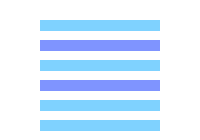
1.3.5 (1 > 38) - THE KHIEN HEXAGRAM
- 3. In the third line, undivided, (we see its subject as) the superior man active and vigilant all the day, and in the evening still careful and apprehensive. (The position is) dangerous, but there will be no mistake.
- 5. In the fifth line, undivided, (we see its subject as) the dragon on the wing in the sky. It will be advantageous to meet with the great man.
1.3.5 (1 > 38) - Reject the dubious methods
One cannot teach others because they do not trust the new methods.
Bing DeepL Google Yandex1.3.5 (1 > 38) - Reject the dubious methods
One cannot teach others because they do not trust the new methods.
Bing DeepL Google Yandex1.3.5 (1 > 38) - K’ien, la créativité
K’ien : principe actif, force vitale universelle.
-
3. Le sage est ainsi actif et vigilant tout le jour ; le soir même, il est attentif, veillant et ne se repose pas. S’il survient un danger, une difficulté, il n’en éprouvera aucune suite fâcheuse.
Le sage rétablit toujours la voie de la justice, la foule et refoule sans cesse. -
5. Il s’élève volant dans le ciel. Le principe actif s’élève et produit dans le ciel.
Ainsi le grand homme s’élève à la hauteur de sa mission et de ses œuvres.
1.3.5 (1 > 38) - Rejeter les méthodes douteuses
On ne peut plus instruire les autres car ils n'ont pas confiance dans les nouvelles méthodes.
Bing DeepL Google Yandex1.3.5 (1 > 38) - Fejlődés
- 3. Kitartó tevékenység után magára talál.
- 5. Felismeri az időszak támasztotta igényeket.
The derived (Fan Yao)
The same line number on the mutated hexagram. It reperesents what can be done AFTER to correct the situation described by this line, as a sort of remedy or solution.
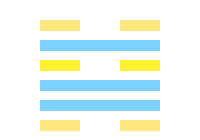
48.4 (48 > 28) - THE 3INGHEXAGRAM.
The fourth line, divided, shows a well,the lining of which is well laid. There will be no error.
Bing DeepL Google Yandex48.4 (48 > 28) - Returning to the source
One has paused to replenish the reserves.
Bing DeepL Google Yandex48.4 (48 > 28) - Returning to the source
One has paused to replenish the reserves.
Bing DeepL Google Yandex48.4 (48 > 28) - Tsing, le puits
Tsing : puits.
Un puits bien construit, citerné, est une chose de haute utilité.
Bing DeepL Google Yandex48.4 (48 > 28) - Retourner à la source
On a fait une pause pour reconstituer les réserves.
Bing DeepL Google YandexThe juncture: 47.3
The derived of the reciprocal. It represents what could have been done BEFORE to prevent the situation described by this line, as a sort of remedy or solution.
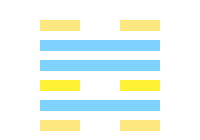
47.3 (47 > 28) - THE KHWĂN HEXAGRAM.
The third line, divided, shows its subject straitened before a (frowning) rock. He lays hold of thorns. He enters his palace, and does not see his wife. There will be evil.
Bing DeepL Google Yandex47.3 (47 > 28) - Being demoralised
One loses one' s means so one must ask for help from those whom one had neglected.
Bing DeepL Google Yandex47.3 (47 > 28) - Being demoralized
One loses one' s means so one must ask for help from those whom one had neglected.
Bing DeepL Google Yandex47.3 (47 > 28) - K’uán, la détresse
K’uán : détresse, abattement, dureté, sévérité, mauvais traitements.
Serré contre un rocher, poignant (pour se soutenir) dans des buissons pleins de grosses épines, ou rentrant dans sa maison et n’y trouvant pas sa femme (enlevée par des brigands). [Cas douloureux, mauvaise fortune. Com. II.]
Bing DeepL Google Yandex47.3 (47 > 28) - Être démoralisé
On perd ses moyens alors on doit demander de l'aide à ceux que l'on avait négligé.
Bing DeepL Google Yandex47.3 (47 > 28) - Kényelmetlenség
Elveszti az ítélőképességét, így meg kell kérnie azokat, akiket figyelmen kívül hagyott, hogy segítsenek.
Bing DeepL Google YandexThe reciprocal: 28.3
The hexagram upside down. It represents the opposite situation, and as such is insturmental when validating comments.
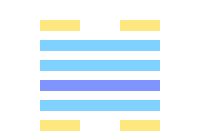
28.3 (28 > 47) - THE TÂ KWO HEXAGRAM.
The third line, undivided, shows a beam that is weak. There will be evil.
Bing DeepL Google Yandex28.3 (28 > 47) - Tá kvoh, le grand excès
Tá kvoh : 1. Grand excès, défaut, manquement ; 2. Traverser, dépasser.
Une poutre, un pilier trop faible (voir texte I) sont mauvais (ils ne peuvent supporter) (grand défaut).
Bing DeepL Google YandexMutations

28.4 (28 > 48) - THE TÂ KWO HEXAGRAM.
The fourth line, undivided, shows a beam curving upwards. There will be good fortune. If (the subject of it) looks for other (help but that of line one), there will be cause for regret.
Bing DeepL Google Yandex28.4 (28 > 48) - Being weakened
One is supported by others but needs to recover.
Bing DeepL Google Yandex28.4 (28 > 48) - Being weakened
One is supported by others but needs to recover.
Bing DeepL Google Yandex28.4 (28 > 48) - Tá kvoh, le grand excès
Tá kvoh : 1. Grand excès, défaut, manquement ; 2. Traverser, dépasser.
Une colonne haute et forte est bonne ; toute autre est dangereuse (opposition à ce qui précède)
Bing DeepL Google Yandex28.4 (28 > 48) - Être affaibli
On a le soutien des autres mais on a besoin de récupérer.
Bing DeepL Google Yandex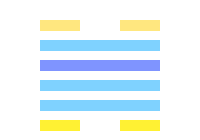
28.1.4 (28 > 5) - THE TÂ KWO HEXAGRAM.
- 1. The first line, divided, shows one placing mats of the white mâo grass under things set on the ground. There will be no error.
- 4. The fourth line, undivided, shows a beam curving upwards. There will be good fortune. If (the subject of it) looks for other (help but that of line one), there will be cause for regret.
28.1.4 (28 > 5) - Recharging one's batteries before action
One draws strength so one won't have to regret having left.
Bing DeepL Google Yandex28.1.4 (28 > 5) - Recharging one's batteries before action
One draws strength so one won't have to regret having left.
Bing DeepL Google Yandex28.1.4 (28 > 5) - Tá kvoh, le grand excès
Tá kvoh : 1. Grand excès, défaut, manquement ; 2. Traverser, dépasser.
-
1. Ceci est susceptible de deux explications : a. « S’appuyer sur des joncs » est un grand défaut ; ils plient et ne soutiennent pas. b. Pour placer un objet comme natte à offrande, se servir de mao blanc est fautif.
Note. Au lieu de gratter simplement la terre et l’aplanir.
(Le mao blanc représente la pureté, la droiture, kiet tche. Ceci d’après le commentaire représente un excès de précaution. Kwéh hu weï shin (1er sens). - 4. Une colonne haute et forte est bonne ; toute autre est dangereuse (opposition à ce qui précède)
28.1.4 (28 > 5) - Se ressourcer avant l'action
On puise des forces pour ne pas avoir à regretter d'être parti.
Bing DeepL Google Yandex28.1.4 (28 > 5) - Lemondás
- 1. Fejlődni akar a gyengeség miatt.
- 4. Mások támogatják de még fel kell épülnie.
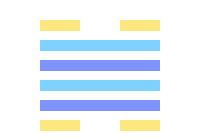
28.2.4 (28 > 39) - THE TÂ KWO HEXAGRAM.
- 2. The second line, undivided, shows a decayed willow producing shoots, or an old husband in possession of his young wife. There will be advantage in every way.
- 4. The fourth line, undivided, shows a beam curving upwards. There will be good fortune. If (the subject of it) looks for other (help but that of line one), there will be cause for regret.
28.2.4 (28 > 39) - Lacking patience
One is downgrading one's chances of success.
Bing DeepL Google Yandex28.2.4 (28 > 39) - Lacking patience
One is downgrading one's chances of success.
Bing DeepL Google Yandex28.2.4 (28 > 39) - Tá kvoh, le grand excès
Tá kvoh : 1. Grand excès, défaut, manquement ; 2. Traverser, dépasser.
- 2.
- 4. Une colonne haute et forte est bonne ; toute autre est dangereuse (opposition à ce qui précède)
28.2.4 (28 > 39) - Manquer de patience
On revoit à la baisse ses chances de succès.
Bing DeepL Google Yandex28.2.4 (28 > 39) - Lemondás
- 2. Ha valaki nehézségekbe ütközik, emelje fel a leggyengébbet is hogy megőrizhesse jövőjét.
- 4. Mások támogatják de még fel kell épülnie.
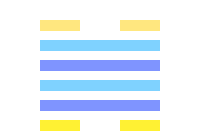
28.1.2.4 (28 > 63) - THE TÂ KWO HEXAGRAM.
- 1. The first line, divided, shows one placing mats of the white mâo grass under things set on the ground. There will be no error.
- 2. The second line, undivided, shows a decayed willow producing shoots, or an old husband in possession of his young wife. There will be advantage in every way.
- 4. The fourth line, undivided, shows a beam curving upwards. There will be good fortune. If (the subject of it) looks for other (help but that of line one), there will be cause for regret.
28.1.2.4 (28 > 63) - Keeping promises
One informs one's entourage of the arrival of the first products of the year.
Bing DeepL Google Yandex28.1.2.4 (28 > 63) - Keeping promises
One informs one's entourage of the arrival of the first products of the year.
Bing DeepL Google Yandex28.1.2.4 (28 > 63) - Tá kvoh, le grand excès
Tá kvoh : 1. Grand excès, défaut, manquement ; 2. Traverser, dépasser.
-
1. Ceci est susceptible de deux explications : a. « S’appuyer sur des joncs » est un grand défaut ; ils plient et ne soutiennent pas. b. Pour placer un objet comme natte à offrande, se servir de mao blanc est fautif.
Note. Au lieu de gratter simplement la terre et l’aplanir.
(Le mao blanc représente la pureté, la droiture, kiet tche. Ceci d’après le commentaire représente un excès de précaution. Kwéh hu weï shin (1er sens). - 2.
- 4. Une colonne haute et forte est bonne ; toute autre est dangereuse (opposition à ce qui précède)
28.1.2.4 (28 > 63) - Tenir ses promesses
On prévient son entourage de l'arrivée des premiers produits de l'année.
Bing DeepL Google Yandex28.1.2.4 (28 > 63) - Lemondás
- 1. Fejlődni akar a gyengeség miatt.
- 2. Ha valaki nehézségekbe ütközik, emelje fel a leggyengébbet is hogy megőrizhesse jövőjét.
- 4. Mások támogatják de még fel kell épülnie.
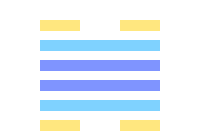
28.3.4 (28 > 29) - THE TÂ KWO HEXAGRAM.
- 3. The third line, undivided, shows a beam that is weak. There will be evil.
- 4. The fourth line, undivided, shows a beam curving upwards. There will be good fortune. If (the subject of it) looks for other (help but that of line one), there will be cause for regret.
28.3.4 (28 > 29) - Contradicting those who are sincere
One commits irreparable mistakes in attempting to overtake others.
Bing DeepL Google Yandex28.3.4 (28 > 29) - Contradicting those who are sincere
One commits irreparable mistakes in attempting to overtake others.
Bing DeepL Google Yandex28.3.4 (28 > 29) - Tá kvoh, le grand excès
Tá kvoh : 1. Grand excès, défaut, manquement ; 2. Traverser, dépasser.
- 3. Une poutre, un pilier trop faible (voir texte I) sont mauvais (ils ne peuvent supporter) (grand défaut).
- 4. Une colonne haute et forte est bonne ; toute autre est dangereuse (opposition à ce qui précède)
28.3.4 (28 > 29) - Contredire ceux qui sont sincères
On commet des erreurs irréparables en tentant de prendre l'ascendant sur les autres.
Bing DeepL Google Yandex28.3.4 (28 > 29) - Lemondás
- 3. Ápolja kapcsolatait.
- 4. Mások támogatják de még fel kell épülnie.
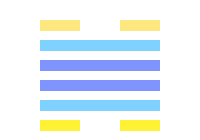
28.1.3.4 (28 > 60) - THE TÂ KWO HEXAGRAM.
- 1. The first line, divided, shows one placing mats of the white mâo grass under things set on the ground. There will be no error.
- 3. The third line, undivided, shows a beam that is weak. There will be evil.
- 4. The fourth line, undivided, shows a beam curving upwards. There will be good fortune. If (the subject of it) looks for other (help but that of line one), there will be cause for regret.
28.1.3.4 (28 > 60) - Being uncompromising
One stops lecturing to take action.
Bing DeepL Google Yandex28.1.3.4 (28 > 60) - Being uncompromising
One stops lecturing to take action.
Bing DeepL Google Yandex28.1.3.4 (28 > 60) - Tá kvoh, le grand excès
Tá kvoh : 1. Grand excès, défaut, manquement ; 2. Traverser, dépasser.
-
1. Ceci est susceptible de deux explications : a. « S’appuyer sur des joncs » est un grand défaut ; ils plient et ne soutiennent pas. b. Pour placer un objet comme natte à offrande, se servir de mao blanc est fautif.
Note. Au lieu de gratter simplement la terre et l’aplanir.
(Le mao blanc représente la pureté, la droiture, kiet tche. Ceci d’après le commentaire représente un excès de précaution. Kwéh hu weï shin (1er sens). - 3. Une poutre, un pilier trop faible (voir texte I) sont mauvais (ils ne peuvent supporter) (grand défaut).
- 4. Une colonne haute et forte est bonne ; toute autre est dangereuse (opposition à ce qui précède)
28.1.3.4 (28 > 60) - Être inflexible
On arrête de faire de la morale pour passer à l'action.
Bing DeepL Google Yandex28.1.3.4 (28 > 60) - Lemondás
- 1. Fejlődni akar a gyengeség miatt.
- 3. Ápolja kapcsolatait.
- 4. Mások támogatják de még fel kell épülnie.
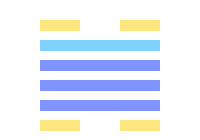
28.2.3.4 (28 > 8) - THE TÂ KWO HEXAGRAM.
- 2. The second line, undivided, shows a decayed willow producing shoots, or an old husband in possession of his young wife. There will be advantage in every way.
- 3. The third line, undivided, shows a beam that is weak. There will be evil.
- 4. The fourth line, undivided, shows a beam curving upwards. There will be good fortune. If (the subject of it) looks for other (help but that of line one), there will be cause for regret.
28.2.3.4 (28 > 8) - Being straightforward
One gives up the superfluous to go straight to the point.
Bing DeepL Google Yandex28.2.3.4 (28 > 8) - Being straightforward
One gives up the superfluous to go straight to the point.
Bing DeepL Google Yandex28.2.3.4 (28 > 8) - Tá kvoh, le grand excès
Tá kvoh : 1. Grand excès, défaut, manquement ; 2. Traverser, dépasser.
- 2.
- 3. Une poutre, un pilier trop faible (voir texte I) sont mauvais (ils ne peuvent supporter) (grand défaut).
- 4. Une colonne haute et forte est bonne ; toute autre est dangereuse (opposition à ce qui précède)
28.2.3.4 (28 > 8) - Être direct
On se passe du superflu pour aller droit au but.
Bing DeepL Google Yandex28.2.3.4 (28 > 8) - Lemondás
- 2. Ha valaki nehézségekbe ütközik, emelje fel a leggyengébbet is hogy megőrizhesse jövőjét.
- 3. Ápolja kapcsolatait.
- 4. Mások támogatják de még fel kell épülnie.
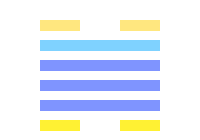
28.1.2.3.4 (28 > 3) - THE TÂ KWO HEXAGRAM.
- 1. The first line, divided, shows one placing mats of the white mâo grass under things set on the ground. There will be no error.
- 2. The second line, undivided, shows a decayed willow producing shoots, or an old husband in possession of his young wife. There will be advantage in every way.
- 3. The third line, undivided, shows a beam that is weak. There will be evil.
- 4. The fourth line, undivided, shows a beam curving upwards. There will be good fortune. If (the subject of it) looks for other (help but that of line one), there will be cause for regret.
28.1.2.3.4 (28 > 3) - Keeping one's secrets
Others may ask for proofs without the need to satisfy them.
Bing DeepL Google Yandex28.1.2.3.4 (28 > 3) - Keeping one's secrets
Others may ask for proofs without the need to satisfy them.
Bing DeepL Google Yandex28.1.2.3.4 (28 > 3) - Tá kvoh, le grand excès
Tá kvoh : 1. Grand excès, défaut, manquement ; 2. Traverser, dépasser.
-
1. Ceci est susceptible de deux explications : a. « S’appuyer sur des joncs » est un grand défaut ; ils plient et ne soutiennent pas. b. Pour placer un objet comme natte à offrande, se servir de mao blanc est fautif.
Note. Au lieu de gratter simplement la terre et l’aplanir.
(Le mao blanc représente la pureté, la droiture, kiet tche. Ceci d’après le commentaire représente un excès de précaution. Kwéh hu weï shin (1er sens). - 2.
- 3. Une poutre, un pilier trop faible (voir texte I) sont mauvais (ils ne peuvent supporter) (grand défaut).
- 4. Une colonne haute et forte est bonne ; toute autre est dangereuse (opposition à ce qui précède)
28.1.2.3.4 (28 > 3) - Garder ses secrets
Les autres peuvent réclamer des preuves sans qu'on ait besoin de les satisfaire.
Bing DeepL Google Yandex28.1.2.3.4 (28 > 3) - Lemondás
- 1. Fejlődni akar a gyengeség miatt.
- 2. Ha valaki nehézségekbe ütközik, emelje fel a leggyengébbet is hogy megőrizhesse jövőjét.
- 3. Ápolja kapcsolatait.
- 4. Mások támogatják de még fel kell épülnie.
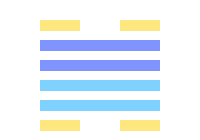
28.4.5 (28 > 46) - THE TÂ KWO HEXAGRAM.
- 4. The fourth line, undivided, shows a beam curving upwards. There will be good fortune. If (the subject of it) looks for other (help but that of line one), there will be cause for regret.
- 5. The fifth line, undivided, shows a decayed willow producing flowers, or an old wife in possession of her young husband. There will be occasion neither for blame nor for praise.
28.4.5 (28 > 46) - Taking a rest
One returns to tell others to stop the work.
Bing DeepL Google Yandex28.4.5 (28 > 46) - Taking a rest
One returns to tell others to stop the work.
Bing DeepL Google Yandex28.4.5 (28 > 46) - Tá kvoh, le grand excès
Tá kvoh : 1. Grand excès, défaut, manquement ; 2. Traverser, dépasser.
- 4. Une colonne haute et forte est bonne ; toute autre est dangereuse (opposition à ce qui précède)
- 5. Un vieux saule produisant une fleur, une vieille femme épousant un homme encore jeune, quoique non blâmables, ne peuvent être loués. La fleur du vieux saule ne peut durer, l’époux d’une vieille femme peut s’en dégoûter. (Faits qui passent les règles ordinaires.)
28.4.5 (28 > 46) - Prendre du repos
On revient pour dire aux autres d'arrêter le travail.
Bing DeepL Google Yandex28.4.5 (28 > 46) - Lemondás
- 4. Mások támogatják de még fel kell épülnie.
- 5. Igyekszik javítani mielőtt mások észrevennék a hanyatlást.
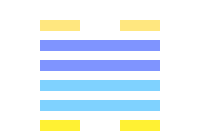
28.1.4.5 (28 > 11) - THE TÂ KWO HEXAGRAM.
- 1. The first line, divided, shows one placing mats of the white mâo grass under things set on the ground. There will be no error.
- 4. The fourth line, undivided, shows a beam curving upwards. There will be good fortune. If (the subject of it) looks for other (help but that of line one), there will be cause for regret.
- 5. The fifth line, undivided, shows a decayed willow producing flowers, or an old wife in possession of her young husband. There will be occasion neither for blame nor for praise.
28.1.4.5 (28 > 11) - Treating the wounded
One cares for those who are condemned to live in the midst of danger.
Bing DeepL Google Yandex28.1.4.5 (28 > 11) - Treating the wounded
One cares for those who are condemned to live in the midst of danger.
Bing DeepL Google Yandex28.1.4.5 (28 > 11) - Tá kvoh, le grand excès
Tá kvoh : 1. Grand excès, défaut, manquement ; 2. Traverser, dépasser.
-
1. Ceci est susceptible de deux explications : a. « S’appuyer sur des joncs » est un grand défaut ; ils plient et ne soutiennent pas. b. Pour placer un objet comme natte à offrande, se servir de mao blanc est fautif.
Note. Au lieu de gratter simplement la terre et l’aplanir.
(Le mao blanc représente la pureté, la droiture, kiet tche. Ceci d’après le commentaire représente un excès de précaution. Kwéh hu weï shin (1er sens). - 4. Une colonne haute et forte est bonne ; toute autre est dangereuse (opposition à ce qui précède)
- 5. Un vieux saule produisant une fleur, une vieille femme épousant un homme encore jeune, quoique non blâmables, ne peuvent être loués. La fleur du vieux saule ne peut durer, l’époux d’une vieille femme peut s’en dégoûter. (Faits qui passent les règles ordinaires.)
28.1.4.5 (28 > 11) - Soigner les blessés
On fait preuve d'égards envers ceux qui sont condamnés à vivre au milieu du danger.
Bing DeepL Google Yandex28.1.4.5 (28 > 11) - Lemondás
- 1. Fejlődni akar a gyengeség miatt.
- 4. Mások támogatják de még fel kell épülnie.
- 5. Igyekszik javítani mielőtt mások észrevennék a hanyatlást.
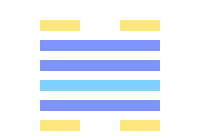
28.2.4.5 (28 > 15) - THE TÂ KWO HEXAGRAM.
- 2. The second line, undivided, shows a decayed willow producing shoots, or an old husband in possession of his young wife. There will be advantage in every way.
- 4. The fourth line, undivided, shows a beam curving upwards. There will be good fortune. If (the subject of it) looks for other (help but that of line one), there will be cause for regret.
- 5. The fifth line, undivided, shows a decayed willow producing flowers, or an old wife in possession of her young husband. There will be occasion neither for blame nor for praise.
28.2.4.5 (28 > 15) - Admitting one's inferiority
One acclaims those who renounce competing for the sake of rectitude.
Bing DeepL Google Yandex28.2.4.5 (28 > 15) - Admitting one's inferiority
One acclaims those who renounce competing for the sake of rectitude.
Bing DeepL Google Yandex28.2.4.5 (28 > 15) - Tá kvoh, le grand excès
Tá kvoh : 1. Grand excès, défaut, manquement ; 2. Traverser, dépasser.
- 2.
- 4. Une colonne haute et forte est bonne ; toute autre est dangereuse (opposition à ce qui précède)
- 5. Un vieux saule produisant une fleur, une vieille femme épousant un homme encore jeune, quoique non blâmables, ne peuvent être loués. La fleur du vieux saule ne peut durer, l’époux d’une vieille femme peut s’en dégoûter. (Faits qui passent les règles ordinaires.)
28.2.4.5 (28 > 15) - Admettre son infériorité
On acclame ceux qui renoncent à concourir par souci de rectitude.
Bing DeepL Google Yandex28.2.4.5 (28 > 15) - Lemondás
- 2. Ha valaki nehézségekbe ütközik, emelje fel a leggyengébbet is hogy megőrizhesse jövőjét.
- 4. Mások támogatják de még fel kell épülnie.
- 5. Igyekszik javítani mielőtt mások észrevennék a hanyatlást.
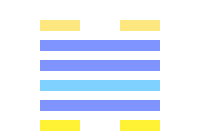
28.1.2.4.5 (28 > 36) - THE TÂ KWO HEXAGRAM.
- 1. The first line, divided, shows one placing mats of the white mâo grass under things set on the ground. There will be no error.
- 2. The second line, undivided, shows a decayed willow producing shoots, or an old husband in possession of his young wife. There will be advantage in every way.
- 4. The fourth line, undivided, shows a beam curving upwards. There will be good fortune. If (the subject of it) looks for other (help but that of line one), there will be cause for regret.
- 5. The fifth line, undivided, shows a decayed willow producing flowers, or an old wife in possession of her young husband. There will be occasion neither for blame nor for praise.
28.1.2.4.5 (28 > 36) - Being unable to make it
One has understood why others did not finish their sentences.
Bing DeepL Google Yandex28.1.2.4.5 (28 > 36) - Being unable to make it
One has understood why others did not finish their sentences.
Bing DeepL Google Yandex28.1.2.4.5 (28 > 36) - Tá kvoh, le grand excès
Tá kvoh : 1. Grand excès, défaut, manquement ; 2. Traverser, dépasser.
-
1. Ceci est susceptible de deux explications : a. « S’appuyer sur des joncs » est un grand défaut ; ils plient et ne soutiennent pas. b. Pour placer un objet comme natte à offrande, se servir de mao blanc est fautif.
Note. Au lieu de gratter simplement la terre et l’aplanir.
(Le mao blanc représente la pureté, la droiture, kiet tche. Ceci d’après le commentaire représente un excès de précaution. Kwéh hu weï shin (1er sens). - 2.
- 4. Une colonne haute et forte est bonne ; toute autre est dangereuse (opposition à ce qui précède)
- 5. Un vieux saule produisant une fleur, une vieille femme épousant un homme encore jeune, quoique non blâmables, ne peuvent être loués. La fleur du vieux saule ne peut durer, l’époux d’une vieille femme peut s’en dégoûter. (Faits qui passent les règles ordinaires.)
28.1.2.4.5 (28 > 36) - Avoir un empêchement
On a compris pourquoi les autres ne terminaient pas leurs phrases.
Bing DeepL Google Yandex28.1.2.4.5 (28 > 36) - Lemondás
- 1. Fejlődni akar a gyengeség miatt.
- 2. Ha valaki nehézségekbe ütközik, emelje fel a leggyengébbet is hogy megőrizhesse jövőjét.
- 4. Mások támogatják de még fel kell épülnie.
- 5. Igyekszik javítani mielőtt mások észrevennék a hanyatlást.
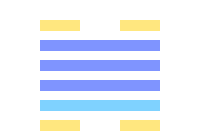
28.3.4.5 (28 > 7) - THE TÂ KWO HEXAGRAM.
- 3. The third line, undivided, shows a beam that is weak. There will be evil.
- 4. The fourth line, undivided, shows a beam curving upwards. There will be good fortune. If (the subject of it) looks for other (help but that of line one), there will be cause for regret.
- 5. The fifth line, undivided, shows a decayed willow producing flowers, or an old wife in possession of her young husband. There will be occasion neither for blame nor for praise.
28.3.4.5 (28 > 7) - Making the journey alone
One wants to produce works without anyone's support.
Bing DeepL Google Yandex28.3.4.5 (28 > 7) - Making the journey alone
One wants to produce works without anyone's support.
Bing DeepL Google Yandex28.3.4.5 (28 > 7) - Tá kvoh, le grand excès
Tá kvoh : 1. Grand excès, défaut, manquement ; 2. Traverser, dépasser.
- 3. Une poutre, un pilier trop faible (voir texte I) sont mauvais (ils ne peuvent supporter) (grand défaut).
- 4. Une colonne haute et forte est bonne ; toute autre est dangereuse (opposition à ce qui précède)
- 5. Un vieux saule produisant une fleur, une vieille femme épousant un homme encore jeune, quoique non blâmables, ne peuvent être loués. La fleur du vieux saule ne peut durer, l’époux d’une vieille femme peut s’en dégoûter. (Faits qui passent les règles ordinaires.)
28.3.4.5 (28 > 7) - Faire la traversée en solitaire
On a envie de réaliser des œuvres sans le soutien de quiconque.
Bing DeepL Google Yandex28.3.4.5 (28 > 7) - Lemondás
- 3. Ápolja kapcsolatait.
- 4. Mások támogatják de még fel kell épülnie.
- 5. Igyekszik javítani mielőtt mások észrevennék a hanyatlást.
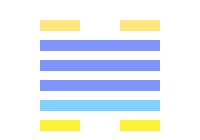
28.1.3.4.5 (28 > 19) - THE TÂ KWO HEXAGRAM.
- 1. The first line, divided, shows one placing mats of the white mâo grass under things set on the ground. There will be no error.
- 3. The third line, undivided, shows a beam that is weak. There will be evil.
- 4. The fourth line, undivided, shows a beam curving upwards. There will be good fortune. If (the subject of it) looks for other (help but that of line one), there will be cause for regret.
- 5. The fifth line, undivided, shows a decayed willow producing flowers, or an old wife in possession of her young husband. There will be occasion neither for blame nor for praise.
28.1.3.4.5 (28 > 19) - Adapting to one's needs
One recalibrates an instrument designed for other uses.
Bing DeepL Google Yandex28.1.3.4.5 (28 > 19) - Adapting to one's needs
One recalibrates an instrument designed for other uses.
Bing DeepL Google Yandex28.1.3.4.5 (28 > 19) - Tá kvoh, le grand excès
Tá kvoh : 1. Grand excès, défaut, manquement ; 2. Traverser, dépasser.
-
1. Ceci est susceptible de deux explications : a. « S’appuyer sur des joncs » est un grand défaut ; ils plient et ne soutiennent pas. b. Pour placer un objet comme natte à offrande, se servir de mao blanc est fautif.
Note. Au lieu de gratter simplement la terre et l’aplanir.
(Le mao blanc représente la pureté, la droiture, kiet tche. Ceci d’après le commentaire représente un excès de précaution. Kwéh hu weï shin (1er sens). - 3. Une poutre, un pilier trop faible (voir texte I) sont mauvais (ils ne peuvent supporter) (grand défaut).
- 4. Une colonne haute et forte est bonne ; toute autre est dangereuse (opposition à ce qui précède)
- 5. Un vieux saule produisant une fleur, une vieille femme épousant un homme encore jeune, quoique non blâmables, ne peuvent être loués. La fleur du vieux saule ne peut durer, l’époux d’une vieille femme peut s’en dégoûter. (Faits qui passent les règles ordinaires.)
28.1.3.4.5 (28 > 19) - Adapter à ses besoins
On recalibre un instrument conçu pour d'autres emplois.
Bing DeepL Google Yandex28.1.3.4.5 (28 > 19) - Lemondás
- 1. Fejlődni akar a gyengeség miatt.
- 3. Ápolja kapcsolatait.
- 4. Mások támogatják de még fel kell épülnie.
- 5. Igyekszik javítani mielőtt mások észrevennék a hanyatlást.
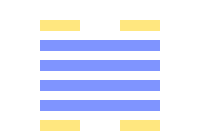
28.2.3.4.5 (28 > 2) - THE TÂ KWO HEXAGRAM.
- 2. The second line, undivided, shows a decayed willow producing shoots, or an old husband in possession of his young wife. There will be advantage in every way.
- 3. The third line, undivided, shows a beam that is weak. There will be evil.
- 4. The fourth line, undivided, shows a beam curving upwards. There will be good fortune. If (the subject of it) looks for other (help but that of line one), there will be cause for regret.
- 5. The fifth line, undivided, shows a decayed willow producing flowers, or an old wife in possession of her young husband. There will be occasion neither for blame nor for praise.
28.2.3.4.5 (28 > 2) - Going all out
One is going to do the best one can so that others are impressed.
Bing DeepL Google Yandex28.2.3.4.5 (28 > 2) - Going all out
One is going to do the best one can so that others are impressed.
Bing DeepL Google Yandex28.2.3.4.5 (28 > 2) - Tá kvoh, le grand excès
Tá kvoh : 1. Grand excès, défaut, manquement ; 2. Traverser, dépasser.
- 2.
- 3. Une poutre, un pilier trop faible (voir texte I) sont mauvais (ils ne peuvent supporter) (grand défaut).
- 4. Une colonne haute et forte est bonne ; toute autre est dangereuse (opposition à ce qui précède)
- 5. Un vieux saule produisant une fleur, une vieille femme épousant un homme encore jeune, quoique non blâmables, ne peuvent être loués. La fleur du vieux saule ne peut durer, l’époux d’une vieille femme peut s’en dégoûter. (Faits qui passent les règles ordinaires.)
28.2.3.4.5 (28 > 2) - Sortir le grand jeu
On va faire du mieux qu’on peut pour que les autres soient impressionnés.
Bing DeepL Google Yandex28.2.3.4.5 (28 > 2) - Lemondás
- 2. Ha valaki nehézségekbe ütközik, emelje fel a leggyengébbet is hogy megőrizhesse jövőjét.
- 3. Ápolja kapcsolatait.
- 4. Mások támogatják de még fel kell épülnie.
- 5. Igyekszik javítani mielőtt mások észrevennék a hanyatlást.
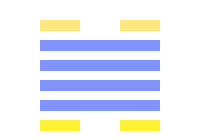
28.1.2.3.4.5 (28 > 24) - THE TÂ KWO HEXAGRAM.
- 1. The first line, divided, shows one placing mats of the white mâo grass under things set on the ground. There will be no error.
- 2. The second line, undivided, shows a decayed willow producing shoots, or an old husband in possession of his young wife. There will be advantage in every way.
- 3. The third line, undivided, shows a beam that is weak. There will be evil.
- 4. The fourth line, undivided, shows a beam curving upwards. There will be good fortune. If (the subject of it) looks for other (help but that of line one), there will be cause for regret.
- 5. The fifth line, undivided, shows a decayed willow producing flowers, or an old wife in possession of her young husband. There will be occasion neither for blame nor for praise.
28.1.2.3.4.5 (28 > 24) - Speaking without taboos
One is referring to practices that have become illegal.
Bing DeepL Google Yandex28.1.2.3.4.5 (28 > 24) - Speaking without taboos
One is referring to practices that have become illegal.
Bing DeepL Google Yandex28.1.2.3.4.5 (28 > 24) - Tá kvoh, le grand excès
Tá kvoh : 1. Grand excès, défaut, manquement ; 2. Traverser, dépasser.
-
1. Ceci est susceptible de deux explications : a. « S’appuyer sur des joncs » est un grand défaut ; ils plient et ne soutiennent pas. b. Pour placer un objet comme natte à offrande, se servir de mao blanc est fautif.
Note. Au lieu de gratter simplement la terre et l’aplanir.
(Le mao blanc représente la pureté, la droiture, kiet tche. Ceci d’après le commentaire représente un excès de précaution. Kwéh hu weï shin (1er sens). - 2.
- 3. Une poutre, un pilier trop faible (voir texte I) sont mauvais (ils ne peuvent supporter) (grand défaut).
- 4. Une colonne haute et forte est bonne ; toute autre est dangereuse (opposition à ce qui précède)
- 5. Un vieux saule produisant une fleur, une vieille femme épousant un homme encore jeune, quoique non blâmables, ne peuvent être loués. La fleur du vieux saule ne peut durer, l’époux d’une vieille femme peut s’en dégoûter. (Faits qui passent les règles ordinaires.)
28.1.2.3.4.5 (28 > 24) - Parler sans tabous
On se réfère à des pratiques devenues illicites.
Bing DeepL Google Yandex28.1.2.3.4.5 (28 > 24) - Lemondás
- 1. Fejlődni akar a gyengeség miatt.
- 2. Ha valaki nehézségekbe ütközik, emelje fel a leggyengébbet is hogy megőrizhesse jövőjét.
- 3. Ápolja kapcsolatait.
- 4. Mások támogatják de még fel kell épülnie.
- 5. Igyekszik javítani mielőtt mások észrevennék a hanyatlást.
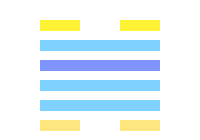
28.4.6 (28 > 57) - THE TÂ KWO HEXAGRAM.
- 4. The fourth line, undivided, shows a beam curving upwards. There will be good fortune. If (the subject of it) looks for other (help but that of line one), there will be cause for regret.
- 6. The topmost line, divided, shows its subject with extraordinary (boldness) wading through a stream, till the water hides the crown of his head. There will be evil, but no ground for blame.
28.4.6 (28 > 57) - Relying on other supports
One finds a solid reason to justify one's absences.
Bing DeepL Google Yandex28.4.6 (28 > 57) - Relying on other supports
One finds a solid reason to justify one's absences.
Bing DeepL Google Yandex28.4.6 (28 > 57) - Tá kvoh, le grand excès
Tá kvoh : 1. Grand excès, défaut, manquement ; 2. Traverser, dépasser.
- 4. Une colonne haute et forte est bonne ; toute autre est dangereuse (opposition à ce qui précède)
- 6. Traversant un fleuve, y entrer jusqu’au sommet de la tête est chose dangereuse, (mais peut n’être point blâmable, si on le fait pour aider quelqu’un, d’après le Com.) (3e sens). Force défaillante.
28.4.6 (28 > 57) - Compter sur d'autres soutiens
On trouve une raison solide pour justifier ses absences.
Bing DeepL Google Yandex28.4.6 (28 > 57) - Lemondás
- 4. Mások támogatják de még fel kell épülnie.
- 6. Egyedül akar haladni a környezők gyengesége miatt.
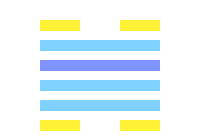
28.1.4.6 (28 > 9) - THE TÂ KWO HEXAGRAM.
- 1. The first line, divided, shows one placing mats of the white mâo grass under things set on the ground. There will be no error.
- 4. The fourth line, undivided, shows a beam curving upwards. There will be good fortune. If (the subject of it) looks for other (help but that of line one), there will be cause for regret.
- 6. The topmost line, divided, shows its subject with extraordinary (boldness) wading through a stream, till the water hides the crown of his head. There will be evil, but no ground for blame.
28.1.4.6 (28 > 9) - Being a pioneer
One is ahead of those who want more assistance.
Bing DeepL Google Yandex28.1.4.6 (28 > 9) - Being a pioneer
One is ahead of those who want more assistance.
Bing DeepL Google Yandex28.1.4.6 (28 > 9) - Tá kvoh, le grand excès
Tá kvoh : 1. Grand excès, défaut, manquement ; 2. Traverser, dépasser.
-
1. Ceci est susceptible de deux explications : a. « S’appuyer sur des joncs » est un grand défaut ; ils plient et ne soutiennent pas. b. Pour placer un objet comme natte à offrande, se servir de mao blanc est fautif.
Note. Au lieu de gratter simplement la terre et l’aplanir.
(Le mao blanc représente la pureté, la droiture, kiet tche. Ceci d’après le commentaire représente un excès de précaution. Kwéh hu weï shin (1er sens). - 4. Une colonne haute et forte est bonne ; toute autre est dangereuse (opposition à ce qui précède)
- 6. Traversant un fleuve, y entrer jusqu’au sommet de la tête est chose dangereuse, (mais peut n’être point blâmable, si on le fait pour aider quelqu’un, d’après le Com.) (3e sens). Force défaillante.
28.1.4.6 (28 > 9) - Être un pionnier
On devance ceux qui veulent avoir plus d'assistance.
Bing DeepL Google Yandex28.1.4.6 (28 > 9) - Lemondás
- 1. Fejlődni akar a gyengeség miatt.
- 4. Mások támogatják de még fel kell épülnie.
- 6. Egyedül akar haladni a környezők gyengesége miatt.
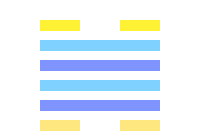
28.2.4.6 (28 > 53) - THE TÂ KWO HEXAGRAM.
- 2. The second line, undivided, shows a decayed willow producing shoots, or an old husband in possession of his young wife. There will be advantage in every way.
- 4. The fourth line, undivided, shows a beam curving upwards. There will be good fortune. If (the subject of it) looks for other (help but that of line one), there will be cause for regret.
- 6. The topmost line, divided, shows its subject with extraordinary (boldness) wading through a stream, till the water hides the crown of his head. There will be evil, but no ground for blame.
28.2.4.6 (28 > 53) - Throwing in the towel
One wants to let others know that one is cutting the losses.
Bing DeepL Google Yandex28.2.4.6 (28 > 53) - Throwing in the towel
One wants to let others know that one is cutting the losses.
Bing DeepL Google Yandex28.2.4.6 (28 > 53) - Tá kvoh, le grand excès
Tá kvoh : 1. Grand excès, défaut, manquement ; 2. Traverser, dépasser.
- 2.
- 4. Une colonne haute et forte est bonne ; toute autre est dangereuse (opposition à ce qui précède)
- 6. Traversant un fleuve, y entrer jusqu’au sommet de la tête est chose dangereuse, (mais peut n’être point blâmable, si on le fait pour aider quelqu’un, d’après le Com.) (3e sens). Force défaillante.
28.2.4.6 (28 > 53) - Jeter l'éponge
On tient à faire savoir aux autres que l'on arrête les frais.
Bing DeepL Google Yandex28.2.4.6 (28 > 53) - Lemondás
- 2. Ha valaki nehézségekbe ütközik, emelje fel a leggyengébbet is hogy megőrizhesse jövőjét.
- 4. Mások támogatják de még fel kell épülnie.
- 6. Egyedül akar haladni a környezők gyengesége miatt.
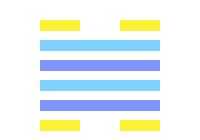
28.1.2.4.6 (28 > 37) - THE TÂ KWO HEXAGRAM.
- 1. The first line, divided, shows one placing mats of the white mâo grass under things set on the ground. There will be no error.
- 2. The second line, undivided, shows a decayed willow producing shoots, or an old husband in possession of his young wife. There will be advantage in every way.
- 4. The fourth line, undivided, shows a beam curving upwards. There will be good fortune. If (the subject of it) looks for other (help but that of line one), there will be cause for regret.
- 6. The topmost line, divided, shows its subject with extraordinary (boldness) wading through a stream, till the water hides the crown of his head. There will be evil, but no ground for blame.
28.1.2.4.6 (28 > 37) - Suffering for one's values
One would rather be hungry and cold than give in to dishonourable pressure.
Bing DeepL Google Yandex28.1.2.4.6 (28 > 37) - Suffering for one's values
One would rather be hungry and cold than give in to dishonorable pressure.
Bing DeepL Google Yandex28.1.2.4.6 (28 > 37) - Tá kvoh, le grand excès
Tá kvoh : 1. Grand excès, défaut, manquement ; 2. Traverser, dépasser.
-
1. Ceci est susceptible de deux explications : a. « S’appuyer sur des joncs » est un grand défaut ; ils plient et ne soutiennent pas. b. Pour placer un objet comme natte à offrande, se servir de mao blanc est fautif.
Note. Au lieu de gratter simplement la terre et l’aplanir.
(Le mao blanc représente la pureté, la droiture, kiet tche. Ceci d’après le commentaire représente un excès de précaution. Kwéh hu weï shin (1er sens). - 2.
- 4. Une colonne haute et forte est bonne ; toute autre est dangereuse (opposition à ce qui précède)
- 6. Traversant un fleuve, y entrer jusqu’au sommet de la tête est chose dangereuse, (mais peut n’être point blâmable, si on le fait pour aider quelqu’un, d’après le Com.) (3e sens). Force défaillante.
28.1.2.4.6 (28 > 37) - Souffrir pour ses valeurs
On préfère plutôt avoir faim et froid que de céder à des pressions indignes.
Bing DeepL Google Yandex28.1.2.4.6 (28 > 37) - Lemondás
- 1. Fejlődni akar a gyengeség miatt.
- 2. Ha valaki nehézségekbe ütközik, emelje fel a leggyengébbet is hogy megőrizhesse jövőjét.
- 4. Mások támogatják de még fel kell épülnie.
- 6. Egyedül akar haladni a környezők gyengesége miatt.
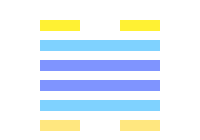
28.3.4.6 (28 > 59) - THE TÂ KWO HEXAGRAM.
- 3. The third line, undivided, shows a beam that is weak. There will be evil.
- 4. The fourth line, undivided, shows a beam curving upwards. There will be good fortune. If (the subject of it) looks for other (help but that of line one), there will be cause for regret.
- 6. The topmost line, divided, shows its subject with extraordinary (boldness) wading through a stream, till the water hides the crown of his head. There will be evil, but no ground for blame.
28.3.4.6 (28 > 59) - Burning bridges
One repaints one's home in red so that others will avoid it.
Bing DeepL Google Yandex28.3.4.6 (28 > 59) - Burning bridges
One repaints one's home in red so that others will avoid it.
Bing DeepL Google Yandex28.3.4.6 (28 > 59) - Tá kvoh, le grand excès
Tá kvoh : 1. Grand excès, défaut, manquement ; 2. Traverser, dépasser.
- 3. Une poutre, un pilier trop faible (voir texte I) sont mauvais (ils ne peuvent supporter) (grand défaut).
- 4. Une colonne haute et forte est bonne ; toute autre est dangereuse (opposition à ce qui précède)
- 6. Traversant un fleuve, y entrer jusqu’au sommet de la tête est chose dangereuse, (mais peut n’être point blâmable, si on le fait pour aider quelqu’un, d’après le Com.) (3e sens). Force défaillante.
28.3.4.6 (28 > 59) - Brûler les ponts
On repeint son habitation en rouge pour que les autres l'évitent.
Bing DeepL Google Yandex28.3.4.6 (28 > 59) - Lemondás
- 3. Ápolja kapcsolatait.
- 4. Mások támogatják de még fel kell épülnie.
- 6. Egyedül akar haladni a környezők gyengesége miatt.
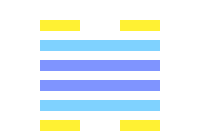
28.1.3.4.6 (28 > 61) - THE TÂ KWO HEXAGRAM.
- 1. The first line, divided, shows one placing mats of the white mâo grass under things set on the ground. There will be no error.
- 3. The third line, undivided, shows a beam that is weak. There will be evil.
- 4. The fourth line, undivided, shows a beam curving upwards. There will be good fortune. If (the subject of it) looks for other (help but that of line one), there will be cause for regret.
- 6. The topmost line, divided, shows its subject with extraordinary (boldness) wading through a stream, till the water hides the crown of his head. There will be evil, but no ground for blame.
28.1.3.4.6 (28 > 61) - Going against the flow
One wants to make progress but is prevented by headwinds.
Bing DeepL Google Yandex28.1.3.4.6 (28 > 61) - Going against the flow
One wants to make progress but is prevented by headwinds.
Bing DeepL Google Yandex28.1.3.4.6 (28 > 61) - Tá kvoh, le grand excès
Tá kvoh : 1. Grand excès, défaut, manquement ; 2. Traverser, dépasser.
-
1. Ceci est susceptible de deux explications : a. « S’appuyer sur des joncs » est un grand défaut ; ils plient et ne soutiennent pas. b. Pour placer un objet comme natte à offrande, se servir de mao blanc est fautif.
Note. Au lieu de gratter simplement la terre et l’aplanir.
(Le mao blanc représente la pureté, la droiture, kiet tche. Ceci d’après le commentaire représente un excès de précaution. Kwéh hu weï shin (1er sens). - 3. Une poutre, un pilier trop faible (voir texte I) sont mauvais (ils ne peuvent supporter) (grand défaut).
- 4. Une colonne haute et forte est bonne ; toute autre est dangereuse (opposition à ce qui précède)
- 6. Traversant un fleuve, y entrer jusqu’au sommet de la tête est chose dangereuse, (mais peut n’être point blâmable, si on le fait pour aider quelqu’un, d’après le Com.) (3e sens). Force défaillante.
28.1.3.4.6 (28 > 61) - Avancer à contre-courant
On veut faire des progrès mais on en est empêché par des vents contraires.
Bing DeepL Google Yandex28.1.3.4.6 (28 > 61) - Lemondás
- 1. Fejlődni akar a gyengeség miatt.
- 3. Ápolja kapcsolatait.
- 4. Mások támogatják de még fel kell épülnie.
- 6. Egyedül akar haladni a környezők gyengesége miatt.
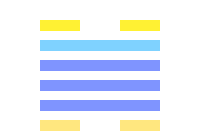
28.2.3.4.6 (28 > 20) - THE TÂ KWO HEXAGRAM.
- 2. The second line, undivided, shows a decayed willow producing shoots, or an old husband in possession of his young wife. There will be advantage in every way.
- 3. The third line, undivided, shows a beam that is weak. There will be evil.
- 4. The fourth line, undivided, shows a beam curving upwards. There will be good fortune. If (the subject of it) looks for other (help but that of line one), there will be cause for regret.
- 6. The topmost line, divided, shows its subject with extraordinary (boldness) wading through a stream, till the water hides the crown of his head. There will be evil, but no ground for blame.
28.2.3.4.6 (28 > 20) - Proving one's worth
One takes the lead over others by showing them one's efficiency.
Bing DeepL Google Yandex28.2.3.4.6 (28 > 20) - Proving one's worth
One takes the lead over others by showing them one's efficiency.
Bing DeepL Google Yandex28.2.3.4.6 (28 > 20) - Tá kvoh, le grand excès
Tá kvoh : 1. Grand excès, défaut, manquement ; 2. Traverser, dépasser.
- 2.
- 3. Une poutre, un pilier trop faible (voir texte I) sont mauvais (ils ne peuvent supporter) (grand défaut).
- 4. Une colonne haute et forte est bonne ; toute autre est dangereuse (opposition à ce qui précède)
- 6. Traversant un fleuve, y entrer jusqu’au sommet de la tête est chose dangereuse, (mais peut n’être point blâmable, si on le fait pour aider quelqu’un, d’après le Com.) (3e sens). Force défaillante.
28.2.3.4.6 (28 > 20) - Faire ses preuves
On prend l'ascendant sur les autres en leur montrant son efficacité.
Bing DeepL Google Yandex28.2.3.4.6 (28 > 20) - Lemondás
- 2. Ha valaki nehézségekbe ütközik, emelje fel a leggyengébbet is hogy megőrizhesse jövőjét.
- 3. Ápolja kapcsolatait.
- 4. Mások támogatják de még fel kell épülnie.
- 6. Egyedül akar haladni a környezők gyengesége miatt.
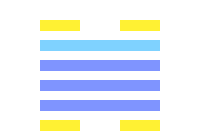
28.1.2.3.4.6 (28 > 42) - THE TÂ KWO HEXAGRAM.
- 1. The first line, divided, shows one placing mats of the white mâo grass under things set on the ground. There will be no error.
- 2. The second line, undivided, shows a decayed willow producing shoots, or an old husband in possession of his young wife. There will be advantage in every way.
- 3. The third line, undivided, shows a beam that is weak. There will be evil.
- 4. The fourth line, undivided, shows a beam curving upwards. There will be good fortune. If (the subject of it) looks for other (help but that of line one), there will be cause for regret.
- 6. The topmost line, divided, shows its subject with extraordinary (boldness) wading through a stream, till the water hides the crown of his head. There will be evil, but no ground for blame.
28.1.2.3.4.6 (28 > 42) - Dissociating
One criticises others to not seem to support them.
Bing DeepL Google Yandex28.1.2.3.4.6 (28 > 42) - Dissociating
One criticizes others to not seem to support them.
Bing DeepL Google Yandex28.1.2.3.4.6 (28 > 42) - Tá kvoh, le grand excès
Tá kvoh : 1. Grand excès, défaut, manquement ; 2. Traverser, dépasser.
-
1. Ceci est susceptible de deux explications : a. « S’appuyer sur des joncs » est un grand défaut ; ils plient et ne soutiennent pas. b. Pour placer un objet comme natte à offrande, se servir de mao blanc est fautif.
Note. Au lieu de gratter simplement la terre et l’aplanir.
(Le mao blanc représente la pureté, la droiture, kiet tche. Ceci d’après le commentaire représente un excès de précaution. Kwéh hu weï shin (1er sens). - 2.
- 3. Une poutre, un pilier trop faible (voir texte I) sont mauvais (ils ne peuvent supporter) (grand défaut).
- 4. Une colonne haute et forte est bonne ; toute autre est dangereuse (opposition à ce qui précède)
- 6. Traversant un fleuve, y entrer jusqu’au sommet de la tête est chose dangereuse, (mais peut n’être point blâmable, si on le fait pour aider quelqu’un, d’après le Com.) (3e sens). Force défaillante.
28.1.2.3.4.6 (28 > 42) - Se désolidariser
On critique les autres pour ne pas avoir l'air de les soutenir.
Bing DeepL Google Yandex28.1.2.3.4.6 (28 > 42) - Lemondás
- 1. Fejlődni akar a gyengeség miatt.
- 2. Ha valaki nehézségekbe ütközik, emelje fel a leggyengébbet is hogy megőrizhesse jövőjét.
- 3. Ápolja kapcsolatait.
- 4. Mások támogatják de még fel kell épülnie.
- 6. Egyedül akar haladni a környezők gyengesége miatt.
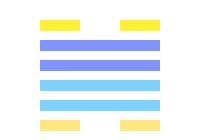
28.4.5.6 (28 > 18) - THE TÂ KWO HEXAGRAM.
- 4. The fourth line, undivided, shows a beam curving upwards. There will be good fortune. If (the subject of it) looks for other (help but that of line one), there will be cause for regret.
- 5. The fifth line, undivided, shows a decayed willow producing flowers, or an old wife in possession of her young husband. There will be occasion neither for blame nor for praise.
- 6. The topmost line, divided, shows its subject with extraordinary (boldness) wading through a stream, till the water hides the crown of his head. There will be evil, but no ground for blame.
28.4.5.6 (28 > 18) - Signing a discharge
One steps back to let the most competent take the matter in hand.
Bing DeepL Google Yandex28.4.5.6 (28 > 18) - Signing a discharge
One steps back to let the most competent take the matter in hand.
Bing DeepL Google Yandex28.4.5.6 (28 > 18) - Tá kvoh, le grand excès
Tá kvoh : 1. Grand excès, défaut, manquement ; 2. Traverser, dépasser.
- 4. Une colonne haute et forte est bonne ; toute autre est dangereuse (opposition à ce qui précède)
- 5. Un vieux saule produisant une fleur, une vieille femme épousant un homme encore jeune, quoique non blâmables, ne peuvent être loués. La fleur du vieux saule ne peut durer, l’époux d’une vieille femme peut s’en dégoûter. (Faits qui passent les règles ordinaires.)
- 6. Traversant un fleuve, y entrer jusqu’au sommet de la tête est chose dangereuse, (mais peut n’être point blâmable, si on le fait pour aider quelqu’un, d’après le Com.) (3e sens). Force défaillante.
28.4.5.6 (28 > 18) - Signer une décharge
On recule pour laisser les plus compétents prendre les choses en main.
Bing DeepL Google Yandex28.4.5.6 (28 > 18) - Lemondás
- 4. Mások támogatják de még fel kell épülnie.
- 5. Igyekszik javítani mielőtt mások észrevennék a hanyatlást.
- 6. Egyedül akar haladni a környezők gyengesége miatt.
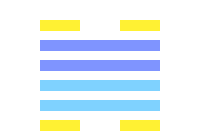
28.1.4.5.6 (28 > 26) - THE TÂ KWO HEXAGRAM.
- 1. The first line, divided, shows one placing mats of the white mâo grass under things set on the ground. There will be no error.
- 4. The fourth line, undivided, shows a beam curving upwards. There will be good fortune. If (the subject of it) looks for other (help but that of line one), there will be cause for regret.
- 5. The fifth line, undivided, shows a decayed willow producing flowers, or an old wife in possession of her young husband. There will be occasion neither for blame nor for praise.
- 6. The topmost line, divided, shows its subject with extraordinary (boldness) wading through a stream, till the water hides the crown of his head. There will be evil, but no ground for blame.
28.1.4.5.6 (28 > 26) - Becoming an expert
One studies minutely a work that others have created.
Bing DeepL Google Yandex28.1.4.5.6 (28 > 26) - Becoming an expert
One studies minutely a work that others have created.
Bing DeepL Google Yandex28.1.4.5.6 (28 > 26) - Tá kvoh, le grand excès
Tá kvoh : 1. Grand excès, défaut, manquement ; 2. Traverser, dépasser.
-
1. Ceci est susceptible de deux explications : a. « S’appuyer sur des joncs » est un grand défaut ; ils plient et ne soutiennent pas. b. Pour placer un objet comme natte à offrande, se servir de mao blanc est fautif.
Note. Au lieu de gratter simplement la terre et l’aplanir.
(Le mao blanc représente la pureté, la droiture, kiet tche. Ceci d’après le commentaire représente un excès de précaution. Kwéh hu weï shin (1er sens). - 4. Une colonne haute et forte est bonne ; toute autre est dangereuse (opposition à ce qui précède)
- 5. Un vieux saule produisant une fleur, une vieille femme épousant un homme encore jeune, quoique non blâmables, ne peuvent être loués. La fleur du vieux saule ne peut durer, l’époux d’une vieille femme peut s’en dégoûter. (Faits qui passent les règles ordinaires.)
- 6. Traversant un fleuve, y entrer jusqu’au sommet de la tête est chose dangereuse, (mais peut n’être point blâmable, si on le fait pour aider quelqu’un, d’après le Com.) (3e sens). Force défaillante.
28.1.4.5.6 (28 > 26) - Devenir un expert
On étudie dans ses moindres détails une œuvre que les autres ont réalisée.
Bing DeepL Google Yandex28.1.4.5.6 (28 > 26) - Lemondás
- 1. Fejlődni akar a gyengeség miatt.
- 4. Mások támogatják de még fel kell épülnie.
- 5. Igyekszik javítani mielőtt mások észrevennék a hanyatlást.
- 6. Egyedül akar haladni a környezők gyengesége miatt.
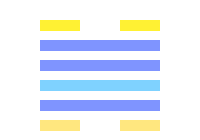
28.2.4.5.6 (28 > 52) - THE TÂ KWO HEXAGRAM.
- 2. The second line, undivided, shows a decayed willow producing shoots, or an old husband in possession of his young wife. There will be advantage in every way.
- 4. The fourth line, undivided, shows a beam curving upwards. There will be good fortune. If (the subject of it) looks for other (help but that of line one), there will be cause for regret.
- 5. The fifth line, undivided, shows a decayed willow producing flowers, or an old wife in possession of her young husband. There will be occasion neither for blame nor for praise.
- 6. The topmost line, divided, shows its subject with extraordinary (boldness) wading through a stream, till the water hides the crown of his head. There will be evil, but no ground for blame.
28.2.4.5.6 (28 > 52) - Lending consumables
One borrows an object without any guarantee of being able to return it intact.
Bing DeepL Google Yandex28.2.4.5.6 (28 > 52) - Lending consumables
One borrows an object without any guarantee of being able to return it intact.
Bing DeepL Google Yandex28.2.4.5.6 (28 > 52) - Tá kvoh, le grand excès
Tá kvoh : 1. Grand excès, défaut, manquement ; 2. Traverser, dépasser.
- 2.
- 4. Une colonne haute et forte est bonne ; toute autre est dangereuse (opposition à ce qui précède)
- 5. Un vieux saule produisant une fleur, une vieille femme épousant un homme encore jeune, quoique non blâmables, ne peuvent être loués. La fleur du vieux saule ne peut durer, l’époux d’une vieille femme peut s’en dégoûter. (Faits qui passent les règles ordinaires.)
- 6. Traversant un fleuve, y entrer jusqu’au sommet de la tête est chose dangereuse, (mais peut n’être point blâmable, si on le fait pour aider quelqu’un, d’après le Com.) (3e sens). Force défaillante.
28.2.4.5.6 (28 > 52) - Prêter des consommables
On emprunte un objet sans garantie de pouvoir le rendre intact.
Bing DeepL Google Yandex28.2.4.5.6 (28 > 52) - Lemondás
- 2. Ha valaki nehézségekbe ütközik, emelje fel a leggyengébbet is hogy megőrizhesse jövőjét.
- 4. Mások támogatják de még fel kell épülnie.
- 5. Igyekszik javítani mielőtt mások észrevennék a hanyatlást.
- 6. Egyedül akar haladni a környezők gyengesége miatt.
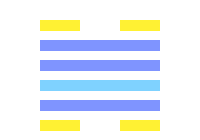
28.1.2.4.5.6 (28 > 22) - THE TÂ KWO HEXAGRAM.
- 1. The first line, divided, shows one placing mats of the white mâo grass under things set on the ground. There will be no error.
- 2. The second line, undivided, shows a decayed willow producing shoots, or an old husband in possession of his young wife. There will be advantage in every way.
- 4. The fourth line, undivided, shows a beam curving upwards. There will be good fortune. If (the subject of it) looks for other (help but that of line one), there will be cause for regret.
- 5. The fifth line, undivided, shows a decayed willow producing flowers, or an old wife in possession of her young husband. There will be occasion neither for blame nor for praise.
- 6. The topmost line, divided, shows its subject with extraordinary (boldness) wading through a stream, till the water hides the crown of his head. There will be evil, but no ground for blame.
28.1.2.4.5.6 (28 > 22) - Bringing a smile back
One comforts the losers by giving them a portion of one's earnings.
Bing DeepL Google Yandex28.1.2.4.5.6 (28 > 22) - Bringing a smile back
One comforts the losers by giving them a portion of one's earnings.
Bing DeepL Google Yandex28.1.2.4.5.6 (28 > 22) - Tá kvoh, le grand excès
Tá kvoh : 1. Grand excès, défaut, manquement ; 2. Traverser, dépasser.
-
1. Ceci est susceptible de deux explications : a. « S’appuyer sur des joncs » est un grand défaut ; ils plient et ne soutiennent pas. b. Pour placer un objet comme natte à offrande, se servir de mao blanc est fautif.
Note. Au lieu de gratter simplement la terre et l’aplanir.
(Le mao blanc représente la pureté, la droiture, kiet tche. Ceci d’après le commentaire représente un excès de précaution. Kwéh hu weï shin (1er sens). - 2.
- 4. Une colonne haute et forte est bonne ; toute autre est dangereuse (opposition à ce qui précède)
- 5. Un vieux saule produisant une fleur, une vieille femme épousant un homme encore jeune, quoique non blâmables, ne peuvent être loués. La fleur du vieux saule ne peut durer, l’époux d’une vieille femme peut s’en dégoûter. (Faits qui passent les règles ordinaires.)
- 6. Traversant un fleuve, y entrer jusqu’au sommet de la tête est chose dangereuse, (mais peut n’être point blâmable, si on le fait pour aider quelqu’un, d’après le Com.) (3e sens). Force défaillante.
28.1.2.4.5.6 (28 > 22) - Rendre le sourire
On réconforte les perdants en leur donnant une partie de ses gains.
Bing DeepL Google Yandex28.1.2.4.5.6 (28 > 22) - Lemondás
- 1. Fejlődni akar a gyengeség miatt.
- 2. Ha valaki nehézségekbe ütközik, emelje fel a leggyengébbet is hogy megőrizhesse jövőjét.
- 4. Mások támogatják de még fel kell épülnie.
- 5. Igyekszik javítani mielőtt mások észrevennék a hanyatlást.
- 6. Egyedül akar haladni a környezők gyengesége miatt.
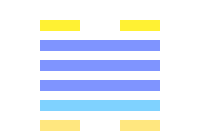
28.3.4.5.6 (28 > 4) - THE TÂ KWO HEXAGRAM.
- 3. The third line, undivided, shows a beam that is weak. There will be evil.
- 4. The fourth line, undivided, shows a beam curving upwards. There will be good fortune. If (the subject of it) looks for other (help but that of line one), there will be cause for regret.
- 5. The fifth line, undivided, shows a decayed willow producing flowers, or an old wife in possession of her young husband. There will be occasion neither for blame nor for praise.
- 6. The topmost line, divided, shows its subject with extraordinary (boldness) wading through a stream, till the water hides the crown of his head. There will be evil, but no ground for blame.
28.3.4.5.6 (28 > 4) - Admitting that one cannot succeed without help
One knows that others have painful things to confess.
Bing DeepL Google Yandex28.3.4.5.6 (28 > 4) - Admitting that one cannot succeed without help
One knows that others have painful things to confess.
Bing DeepL Google Yandex28.3.4.5.6 (28 > 4) - Tá kvoh, le grand excès
Tá kvoh : 1. Grand excès, défaut, manquement ; 2. Traverser, dépasser.
- 3. Une poutre, un pilier trop faible (voir texte I) sont mauvais (ils ne peuvent supporter) (grand défaut).
- 4. Une colonne haute et forte est bonne ; toute autre est dangereuse (opposition à ce qui précède)
- 5. Un vieux saule produisant une fleur, une vieille femme épousant un homme encore jeune, quoique non blâmables, ne peuvent être loués. La fleur du vieux saule ne peut durer, l’époux d’une vieille femme peut s’en dégoûter. (Faits qui passent les règles ordinaires.)
- 6. Traversant un fleuve, y entrer jusqu’au sommet de la tête est chose dangereuse, (mais peut n’être point blâmable, si on le fait pour aider quelqu’un, d’après le Com.) (3e sens). Force défaillante.
28.3.4.5.6 (28 > 4) - Admettre qu'on ne peut pas réussir sans aide
On sait que les autres ont des choses pénibles à avouer.
Bing DeepL Google Yandex28.3.4.5.6 (28 > 4) - Lemondás
- 3. Ápolja kapcsolatait.
- 4. Mások támogatják de még fel kell épülnie.
- 5. Igyekszik javítani mielőtt mások észrevennék a hanyatlást.
- 6. Egyedül akar haladni a környezők gyengesége miatt.
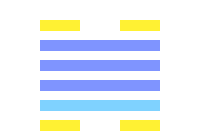
28.1.3.4.5.6 (28 > 41) - THE TÂ KWO HEXAGRAM.
- 1. The first line, divided, shows one placing mats of the white mâo grass under things set on the ground. There will be no error.
- 3. The third line, undivided, shows a beam that is weak. There will be evil.
- 4. The fourth line, undivided, shows a beam curving upwards. There will be good fortune. If (the subject of it) looks for other (help but that of line one), there will be cause for regret.
- 5. The fifth line, undivided, shows a decayed willow producing flowers, or an old wife in possession of her young husband. There will be occasion neither for blame nor for praise.
- 6. The topmost line, divided, shows its subject with extraordinary (boldness) wading through a stream, till the water hides the crown of his head. There will be evil, but no ground for blame.
28.1.3.4.5.6 (28 > 41) - Losing one's essence
One studies carefully the causes of one's decline.
Bing DeepL Google Yandex28.1.3.4.5.6 (28 > 41) - Losing one's essence
One studies carefully the causes of one's decline.
Bing DeepL Google Yandex28.1.3.4.5.6 (28 > 41) - Tá kvoh, le grand excès
Tá kvoh : 1. Grand excès, défaut, manquement ; 2. Traverser, dépasser.
-
1. Ceci est susceptible de deux explications : a. « S’appuyer sur des joncs » est un grand défaut ; ils plient et ne soutiennent pas. b. Pour placer un objet comme natte à offrande, se servir de mao blanc est fautif.
Note. Au lieu de gratter simplement la terre et l’aplanir.
(Le mao blanc représente la pureté, la droiture, kiet tche. Ceci d’après le commentaire représente un excès de précaution. Kwéh hu weï shin (1er sens). - 3. Une poutre, un pilier trop faible (voir texte I) sont mauvais (ils ne peuvent supporter) (grand défaut).
- 4. Une colonne haute et forte est bonne ; toute autre est dangereuse (opposition à ce qui précède)
- 5. Un vieux saule produisant une fleur, une vieille femme épousant un homme encore jeune, quoique non blâmables, ne peuvent être loués. La fleur du vieux saule ne peut durer, l’époux d’une vieille femme peut s’en dégoûter. (Faits qui passent les règles ordinaires.)
- 6. Traversant un fleuve, y entrer jusqu’au sommet de la tête est chose dangereuse, (mais peut n’être point blâmable, si on le fait pour aider quelqu’un, d’après le Com.) (3e sens). Force défaillante.
28.1.3.4.5.6 (28 > 41) - Perdre son essence
On étudie avec attention les causes de sa déchéance.
Bing DeepL Google Yandex28.1.3.4.5.6 (28 > 41) - Lemondás
- 1. Fejlődni akar a gyengeség miatt.
- 3. Ápolja kapcsolatait.
- 4. Mások támogatják de még fel kell épülnie.
- 5. Igyekszik javítani mielőtt mások észrevennék a hanyatlást.
- 6. Egyedül akar haladni a környezők gyengesége miatt.
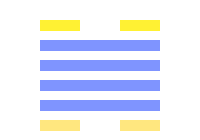
28.2.3.4.5.6 (28 > 23) - THE TÂ KWO HEXAGRAM.
- 2. The second line, undivided, shows a decayed willow producing shoots, or an old husband in possession of his young wife. There will be advantage in every way.
- 3. The third line, undivided, shows a beam that is weak. There will be evil.
- 4. The fourth line, undivided, shows a beam curving upwards. There will be good fortune. If (the subject of it) looks for other (help but that of line one), there will be cause for regret.
- 5. The fifth line, undivided, shows a decayed willow producing flowers, or an old wife in possession of her young husband. There will be occasion neither for blame nor for praise.
- 6. The topmost line, divided, shows its subject with extraordinary (boldness) wading through a stream, till the water hides the crown of his head. There will be evil, but no ground for blame.
28.2.3.4.5.6 (28 > 23) - Stealing one's reputation
One is taking credit for something that belongs to someone else.
Bing DeepL Google Yandex28.2.3.4.5.6 (28 > 23) - Stealing one's reputation
One is taking credit for something that belongs to someone else.
Bing DeepL Google Yandex28.2.3.4.5.6 (28 > 23) - Tá kvoh, le grand excès
Tá kvoh : 1. Grand excès, défaut, manquement ; 2. Traverser, dépasser.
- 2.
- 3. Une poutre, un pilier trop faible (voir texte I) sont mauvais (ils ne peuvent supporter) (grand défaut).
- 4. Une colonne haute et forte est bonne ; toute autre est dangereuse (opposition à ce qui précède)
- 5. Un vieux saule produisant une fleur, une vieille femme épousant un homme encore jeune, quoique non blâmables, ne peuvent être loués. La fleur du vieux saule ne peut durer, l’époux d’une vieille femme peut s’en dégoûter. (Faits qui passent les règles ordinaires.)
- 6. Traversant un fleuve, y entrer jusqu’au sommet de la tête est chose dangereuse, (mais peut n’être point blâmable, si on le fait pour aider quelqu’un, d’après le Com.) (3e sens). Force défaillante.
28.2.3.4.5.6 (28 > 23) - Voler sa réputation
On usurpe un mérite qui revient à quelqu'un d'autre.
Bing DeepL Google Yandex28.2.3.4.5.6 (28 > 23) - Lemondás
- 2. Ha valaki nehézségekbe ütközik, emelje fel a leggyengébbet is hogy megőrizhesse jövőjét.
- 3. Ápolja kapcsolatait.
- 4. Mások támogatják de még fel kell épülnie.
- 5. Igyekszik javítani mielőtt mások észrevennék a hanyatlást.
- 6. Egyedül akar haladni a környezők gyengesége miatt.
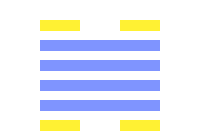
28.1.2.3.4.5.6 (28 > 27) - THE TÂ KWO HEXAGRAM.
- 1. The first line, divided, shows one placing mats of the white mâo grass under things set on the ground. There will be no error.
- 2. The second line, undivided, shows a decayed willow producing shoots, or an old husband in possession of his young wife. There will be advantage in every way.
- 3. The third line, undivided, shows a beam that is weak. There will be evil.
- 4. The fourth line, undivided, shows a beam curving upwards. There will be good fortune. If (the subject of it) looks for other (help but that of line one), there will be cause for regret.
- 5. The fifth line, undivided, shows a decayed willow producing flowers, or an old wife in possession of her young husband. There will be occasion neither for blame nor for praise.
- 6. The topmost line, divided, shows its subject with extraordinary (boldness) wading through a stream, till the water hides the crown of his head. There will be evil, but no ground for blame.
28.1.2.3.4.5.6 (28 > 27) - Offering a wide variety
One completes one's creation with touches of different colors.
Bing DeepL Google Yandex28.1.2.3.4.5.6 (28 > 27) - Offering a wide variety
One completes one's creation with touches of different colors.
Bing DeepL Google Yandex28.1.2.3.4.5.6 (28 > 27) - Tá kvoh, le grand excès
Tá kvoh : 1. Grand excès, défaut, manquement ; 2. Traverser, dépasser.
-
1. Ceci est susceptible de deux explications : a. « S’appuyer sur des joncs » est un grand défaut ; ils plient et ne soutiennent pas. b. Pour placer un objet comme natte à offrande, se servir de mao blanc est fautif.
Note. Au lieu de gratter simplement la terre et l’aplanir.
(Le mao blanc représente la pureté, la droiture, kiet tche. Ceci d’après le commentaire représente un excès de précaution. Kwéh hu weï shin (1er sens). - 2.
- 3. Une poutre, un pilier trop faible (voir texte I) sont mauvais (ils ne peuvent supporter) (grand défaut).
- 4. Une colonne haute et forte est bonne ; toute autre est dangereuse (opposition à ce qui précède)
- 5. Un vieux saule produisant une fleur, une vieille femme épousant un homme encore jeune, quoique non blâmables, ne peuvent être loués. La fleur du vieux saule ne peut durer, l’époux d’une vieille femme peut s’en dégoûter. (Faits qui passent les règles ordinaires.)
- 6. Traversant un fleuve, y entrer jusqu’au sommet de la tête est chose dangereuse, (mais peut n’être point blâmable, si on le fait pour aider quelqu’un, d’après le Com.) (3e sens). Force défaillante.
28.1.2.3.4.5.6 (28 > 27) - Décliner une gamme
On parachève sa création par des touches de différentes couleurs.
Bing DeepL Google Yandex28.1.2.3.4.5.6 (28 > 27) - Lemondás
- 1. Fejlődni akar a gyengeség miatt.
- 2. Ha valaki nehézségekbe ütközik, emelje fel a leggyengébbet is hogy megőrizhesse jövőjét.
- 3. Ápolja kapcsolatait.
- 4. Mások támogatják de még fel kell épülnie.
- 5. Igyekszik javítani mielőtt mások észrevennék a hanyatlást.
- 6. Egyedül akar haladni a környezők gyengesége miatt.

